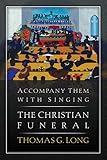A funeral director I know used to joke with his staff when families said they had decided not to have a funeral. “They can pay for a funeral now or for therapy later.” Invariably those patrons would return, often at the advice of a counselor, asking for a funeral.
Modern funerals are viewed as dispensable. When they are performed, families typically prefer to celebrate a life rather than mourn it. And so, complains Emory University professor and preacher Thomas G. Long, into the funeral come movie clips, “open-mike speeches by friends and relatives, multimedia presentations of the life of the deceased, NASCAR logos on caskets,” and other elements full of sentimentality and emotion but little direction and meaning.
But while many churches are uncomfortable with these trends, they are not sure why they oppose them. In Accompany Them with Singing: The Christian Funeral (Westminster John Knox), Long hopes to set churches, and particularly pastors, straight by re-introducing the Christian funeral.
Long argues that a Christian funeral is a dramatic retelling of the gospel. Struck by death, the Christian community worships God by weaving the life of the deceased into the story of God’s gift of eternal life through Jesus Christ’s defeat of death on the cross. While modern funerals focus on mourners to assuage their grief, the Christian funeral “works the other way, drawing private grief and personal loss so fully into the gospel that mourning becomes not only consoled but transformed.”
“As fellow pilgrims on the path,” Long writes, we accompany our brother or sister in Christ to the place where they await the final resurrection. This corporate journey is done through the funeral. It has traditionally involved three steps: caring for the sacred image of God during visitation with the body, processing to the church for a period of worship, followed by a final procession to the place of burial.
While the modern suburban landscape has changed things, the forms are with us—the visitation or wake, the funeral, and the graveside service. But we’ve forgotten what purpose each serves, and we often skip, rearrange, or transform the elements. This leads Long to complain of funerals where the deceased are absent. While he encourages integrating cultural expressions into services, bodiless funerals he cannot abide:
What can this shielding of our eyes from the body of our friend in Christ mean, except that we have begun to prefer the god of Plato and the purity of the immortal soul to the messiness of declaring, in the teeth of death’s apparent victory, the good news of the resurrection of the body and the life everlasting?
Long does more than complain, though. His chapter on the funeral as a worshipful drama guides readers through the theological meaning of each element of a funeral. Accompany Them with Singing is a gift to pastors and lay leaders guiding families through grief, and a primer for anyone thinking about death or preparing a service for a loved one. It is a handbook for providing the most meaningful worship during the most heartbreaking moment of life.
Rob Moll is a CT editor at large and author of the forthcoming The Art of Dying: Living Fully into the Life to Come (InterVarsity Press).
Copyright © 2009 Christianity Today. Click for reprint information.
Related Elsewhere:
Accompany Them with Singing: The Christian Funeral is available at ChristianBook.com and other book retailers.
Christianity Today has a more articles on death and dying, including:
Intensive Care Week | Thoughts while sitting beside my brother as his brain and body failed. (Philip Yancey, September 14, 2009)
In the Valley of the Shadow of Suicide | A mother catches glimmers of hope after losing a son. (April 24, 2009)
The Empty Tomb and the Emptied Urn | What the wounds of Jesus can — and can’t — tell us about our resurrection bodies. (April 7, 2009)











